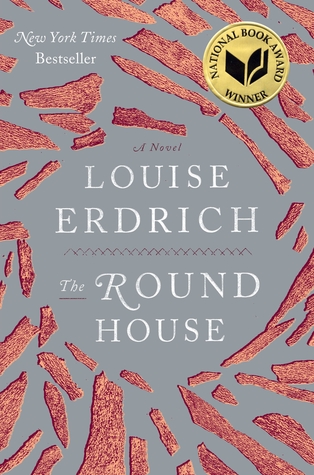Together they had built the round house, the sleeping woman, the unkillable mother, the old lady buffalo. They'd built that place to keep their people together and to ask for mercy from the Creator, since justice was so sketchily applied on earth.Justice, and its sketchy application, is the major theme of The Round House. Set in 1988 on author Louise Erdrich's familiar fictional North Dakota Ojibwe Reservation, a violent rape and attempted murder not only threatens to tear a family apart but it seems likely to go unpunished as the victim refuses to – or is unable to – identify her attacker. Not bound by the technicalities that prevent the authorities from meting out justice, the victim's 13-year-old son Joe engages in an investigation of his own. Ultimately, it's up to the reader to decide if justice is served in the end.
In the afterword, Erdrich explains that while one third of Native American women will be sexually assaulted in their lifetimes (likely higher due to under-reporting), and while 86% of their rapists will be non-Native men, a quirk of law didn't allow non-Natives to be prosecuted for any crimes that occurred on reservations (a loophole that appears to have been closed in 2010). This is such a tragic situation that it certainly deserves the in-depth examination that a fictional approach can provide, but after finishing The Round House, I'm not certain that Erdrich pulled it off. And I think the problem lies with seeing the entire story through young Joe's eyes.
This is a coming-of-age story for Joe, and although the reader is privy to his emerging and evolving adult judgments – which is interesting – there's no immediacy to the tragedy. We don't feel the victim's pain, we see how it affects Joe – no family dinners or warm welcome when he returns home if Mom's taken to her bed – and that somehow makes the attack merely a catalyst as he proceeds to spend his summer hanging out and getting drunk with his pals in the sudden lack of supervision. Joe is in pain – desperate to help his mother – but it's his pain we're focused on. Part Stand By Me, part To Kill a Mockingbird, this book never seemed to capture the easy believability of the former or the gravity of the latter.
And I had a problem with the plotting. Repeatedly, Erdrich found inorganic ways to insert stories: Joe listens to his grandfather orate a fabulous tale over two nights in his sleep; a guest who comes to visit decides to share her entire life history; when Joe's Mom doesn't want to talk, his father fills the silence with family mythology. Joe also breaks the fourth wall a couple of times to explain to the reader that he's relating this whole story from some future time, after he's become a lawyer and returned to the Reservation. Every one of these instances only broke the momentum of the plot. And I didn't like either the cartoonishly evil villain or the Lark/Linda doppelgänger bits.
As an examination of justice, however, Erdrich had some interesting things to say. Just as the round house – the site of the attack – sits at the conjunction of three different jurisdictions (and it's the question over whether the state, federal, or reservation justice systems should take precedence that provides the loophole for the attacker to escape through), so too does the attack sit at the conjunction of different notions of justice. As Joe's father is the tribal judge, he has devoted his life to impeccable jurisprudence, hoping that playing by the white man's law will eventually bring the law back into tribal hands. The Catholic Church figures prominently in this book, and as much as I thought Father Travis – ex-marine and Michelob-drinking videophile – was a fantastic character, his notion of Divine Justice was troubling:
We are never so poor that we cannot bless another human being, are we? So it is that every evil, whether moral or material, results in good. You'll see.As I couldn't find any instances of good resulting from evil in this book, I'm assuming that Erdrich includes this passage as just another meddling white man belief system. Mooshum explains that when someone kills a person possessed by a wiindigoo, that fulfills Indian Law and is therefore totally justified. But no matter what man-made belief system one subscribes to, it would seem that there is no escaping a type of cosmic justice – an attack in a grocery store leads to a heart attack, sexual blackmail leads to losing a rare ally, and although the ending might seem to come out of nowhere, there was a cosmic debt to collect. While I didn't really see the need for the Mayla subplot, in the end, it did underscore that this cosmic justice would have set everything right eventually – if only people had listened to Bugger's dream.
I enjoyed the reservation setting and the incidental description of everyday life, but I missed the lyricism that I so enjoyed in Tracks: if a book is going to include ghosts and visions, I'd like the language to rise about reportage. Ultimately, The Round House didn't so much highlight the inequity of tribal justice as it used that situation to trigger Joe's leap to adulthood. In the beginning, Joe and his father exchange their first man-to-man glance, and by the end:
And there was that moment when my mother and father walked in the door disguised as old people. I thought the miles in the car had bent them, dulled their eyes, even grayed and whitened their hair and caused their hands and voices to tremble. At the same time, I found, as I rose from the chair, I'd gotten old along with them.The Round House wasn't a complete disappointment – and I'm still looking forward to The Plague of Doves – but despite a National Book Award, I don't think this is Erdrich's best work.

